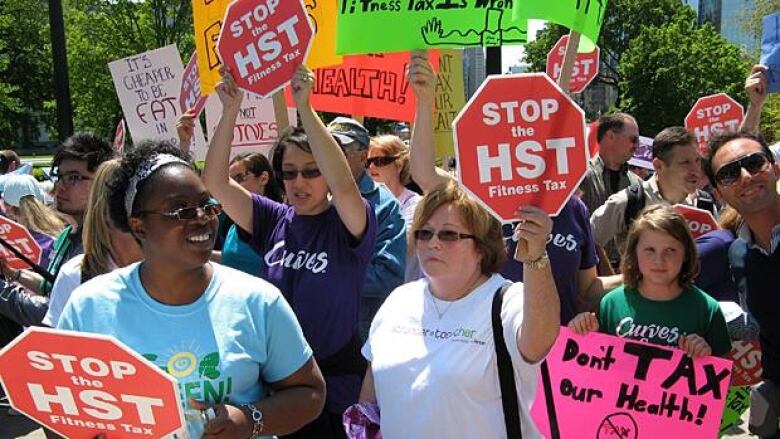What to expect

As of July 1, 2010, Ontario and British Columbia join New Brunswick, Nova Scotia and Newfoundland and Labrador in harmonizing their provincial sales taxes with the goods and services tax.
The Harmonized Sales Tax (HST) applies to a broader range of goods and services than provincial taxes, which meanspeoplewind up paying more taxes.Many items that used to be exempt from sales tax will no longer be so.
What is no longer PST exempt?
Ontario consumers are most likely to notice an increase in the priceof heating fuels,electricity andgasoline, as they willno longer be exempt from PST, but B.C. drivers won't have to pay more for gas.
B.C. drivers will be spared higher gasoline costs and while homeowners will see the HST on their electricity and heating bills, they will receive an instant rebate for the provincial portion of the tax.
The HST will increase the cost oftobacco, personal services like haircuts, membership fees for clubs and gyms, newspapers and magazines, taxi fares and the professional services of lawyers, architects and accountants. Real estate commissions will also be taxed as will the price of new homes. However, B.C. and Ontario will provide HST rebates so new homes will effectively be tax exempt under $525,000 in B.C. and under $400,000 in Ontario.
Will anything remain exempt?
Not a lot. Children's clothing and footwear, children's car seats and car booster seats, books, diapers and feminine hygiene products will remain exempt from the provincial portion of the single sales tax.
Basic groceries, rent, condo fees, prescription drugs, and medical devices remain exempt from both PST and GST.
Purchase of resale homes will remain exempt from PST, although real estate transaction fees will be taxed.
Why are Ontario and B.C. doing this?
The provinces say implementation of the single sales tax would bringthem into line with "what is viewed as the most efficient form of sales taxation around the world." The single sales tax will reduce the cost of exported goods, making the provinces more competitive and boosting a sector of the economy that has been particularly hard hit by the economic downturn.
Businessescan't deduct the PST from the cost of materials and other products they buy; instead, they passthe cost along to consumers. But under harmonization, businesses may claim tax creditsfor those purchases, which some estimates suggest could savethem $3 billion a year.
The Ontario Chamber of Commerce believes a fully blended system would cost consumers approximately $905 million in additional sales taxes per year, while the GST and PST bill for companies would fall by $1.6 billion annually.
The Canadian Federation of Independent Businesses says harmonization will save business $100 million a year in reduced red tape.
Businesses will save a further $500 million a year on the costs of administering a single tax instead of two, according to the budget documents.
Are all businesses on side?
Contractors, developersand homebuilders opposethe blending. Ontario's Building Industry and Land Development Association estimates that a blended tax would add more than$46,000 to the price of a $580,000 new homein Toronto.
Will household expenses rise?
Yes, although the provinces say their offers of rebates will help ease the burden.
So what's the problem?
The provincial NDP saysthe single sales tax would leave families "feeling the pinch" from having to spend more on a range of goodsat a time many are already struggling to deal with job losses.
The Conservatives, while ideologically in favour of harmonizing, say this is no time to be raising taxes.
TheCanadian Real Estate Association says merging the taxescould add more than$2,000 to the cost of a real estate transaction (much more if the deal involves new housing). The association says the real estate market was probably hotter than it normally would have been in the first half of 2010 because people jumped in to beat the HST. The association expects the blended tax to dramatically cool the market in the second half of the year.
What is the HST rate?
The GST is five per cent across the country. In Ontario, the eight per cent provincial sales tax will be added to that, giving an HST rate of 13 per cent. In B.C., the HST rate will be 12 per cent.
As of July 1, 2010, Nova Scotia will add two percentage points to its HST, bringing the rate to 15 per cent. That's the highest in the country. (Prince Edward Island has a provincial sales tax rate of 10 per cent and a GST rate of five per cent, but the taxes are applied to a narrower range of goods and services, so people pay less tax overall.)
The HST rate in New Brunswick and Newfoundland and Labrador is 13 per cent.












_(720p).jpg)


 OFFICIAL HD MUSIC VIDEO.jpg)
.jpg)



























































































